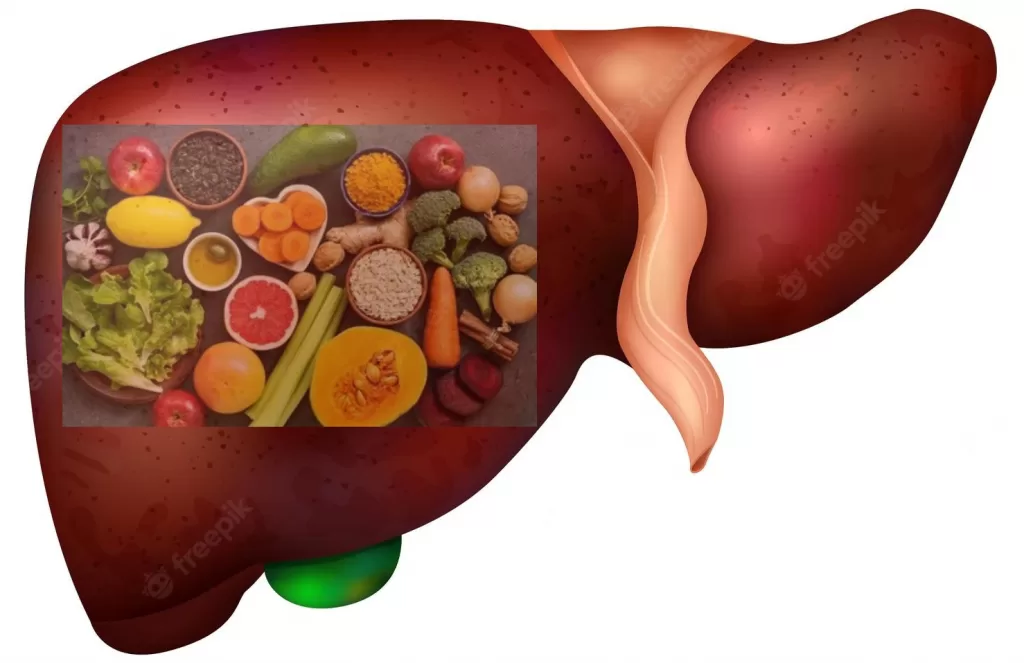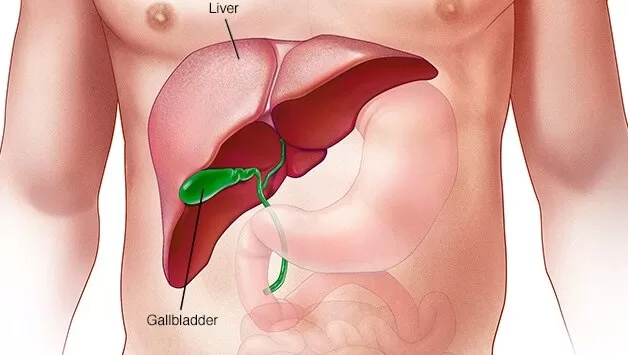The liver is the most important and largest organ in your body. It has many important jobs to do. It keeps you healthy and fit while aiding in digestion and bodily detoxification. You must take care of this organ and make sure it is not harmed by unhealthful behaviors and poor lifestyle decisions. Any liver issues, such as jaundice, hepatitis, and fatty liver disease, might result in complications that you can avoid.
However, there are other strategies to make sure that this organ stays healthy in addition to living a healthy lifestyle. You can also use Ayurvedic principles, which come from India and date back thousands of years, to keep this organ as healthy as possible. You can accomplish this by utilizing a variety of Ayurvedic herbs and formulas.

The Liver And Ayurveda
The liver has a lot of close relationships with various other body organs, tissues, and systems, as its functions would suggest. We can better grasp how to provide the liver with meaningful assistance by looking at these interactions from the ancient yet highly current perspective that Ayurveda offers. According to Ayurveda, the pitta dosha, raktha dhathu, or blood, and agni, or digestive fire, are all related to your liver.
Your liver’s health can affect all three, and an unbalanced state of the three can also affect the its health. Pitta dosha symptoms include jaundice, a fatty liver, cirrhosis, and a liver that is too big or too small. However, since your liver breaks down the food you eat, eating the appropriate meals can maintain the health of this organ.
The liver is the body’s main organ for getting rid of toxins, and its very important job is to protect the deeper tissues from potentially harmful blood pollutants. The liver, on the other hand, can be hurt by too much exposure to toxins like alcohol, prescription or illegal drugs, environmental pollutants, and so on.
Fortunately, the liver has a remarkable capacity for self-healing and renewal. It differs from other organs and tissues in this way. However, we must give it regular rest if we want it to rebuild itself effectively. This post is for you, whether you already have low liver energy or want to take steps to keep it from happening. After all, taking care of this vital organ, today could have a significant impact on your long-term health, happiness, and life.
Important Liver Functions
The liver is thought to execute between 500.1 and 500 different functions in total. We’ve already talked about some of the liver’s most well-known jobs, but let’s take a moment to understand its full range of jobs, most of which is done in cooperation with organs and systems other than the liver:
Detoxification
When we eat, our digestive system breaks down the food into a small amount of easily absorbed energy called rasa dhatu. This energy is then allowed to enter the plasma, which is part of the bloodstream. The liver will next further refine and filter this beneficial “food juice.”
The liver gets rid of unwanted poisons so they don’t spread to other parts of the body. Alcohol, prescription and illicit medicines, and chemical pollutants are all metabolized by the liver.
Formation and Secretion of Bile
Pitta, a Sanskrit term, signifies “bile.” Bile is a fluid made by the liver. It is alkaline and helps break up fats so they can be digested better. The gallbladder, which hangs at the base of the liver, serves as a temporary storage location for it.
The gallbladder releases stored bile into the small intestine as food is digested. As a result, the liver’s and the gallbladder’s health are connected.
Metabolism and Digestion
In the process of breaking down and metabolizing ingested nutrients, the liver is essential. Complex materials like proteins, lipids, and carbohydrates are broken down into biologically useful compounds like glucose, cholesterol, phospholipids, and lipoproteins.
It also, controls and stores glycogen, which is the main source of energy that our bodies can use right away.

Protein Synthesis
The liver is one of the main organs in the body where proteins are broken down, made, and then broken down again. Proteins make up most of the body’s tissues, but they are especially important for keeping our muscles healthy.
Ayurveda says that low or weak liver energy is linked to mamsa dhatu, which is weakness in the muscles.
Additional crucial liver functions
The production and metabolism of hormones, the breakdown, and storage of fat, the control of the body’s pH levels, the production of red blood cells, and the control of blood volume and blood pressure are all functions of the liver.
The Natural Ingredients for Keeping your liver well
Bitter herbs, fruits, and vegetables are also good for you, like apples, carrots, beets, and leafy greens. These ayurvedic foods and herbs help improve liver health.
Tikta( bitters)
Bitter herbs make the stomach release fluids and strengthen the muscles of the digestive tract. This is why everyone agrees that they are good for digestion. They also help detoxification by making it easier for the liver to process nutrients and get rid of waste from the blood. They also have antibacterial and heat-clearing properties that help boost immunity and keep pitta in balance.
Herbalists often mix barberry, dandelion, turmeric, celandine, gentian, goldenseal, chiretta, and/or neem to make “bitter” mixtures. To promote liver function, cleansing, and digestion, these herbs are best given in small quantities as tea or diluted extracts 20 to 30 minutes before a meal. (Pregnant women should initially consult their doctor.)
Example: Papaya
One fruit that has numerous health advantages is this one. However, you need the fruit’s seeds and the papaya tree’s leaves to improve liver function. You can avoid conditions like jaundice and cirrhosis with its help. The seeds can be dried in the sun, ground into a powder, and consumed daily with a teaspoon of warm water.
To make this beverage more strong, squeeze in some lemon juice. You can take some leaves, grind them, and then squeeze the juice out of them. Enjoy this daily. But first, a word of warning. Avoid consuming this if you are breastfeeding or pregnant.
Virechana (purgatives)
Herbal knowledge says that regular bowel movements are needed for the liver to detoxify properly. If you don’t have regular bowel movements, the poisons taken from the liver will be reabsorbed instead of leaving the body. Pitta is said to build up in the small intestines and is released by purgatives (laxatives), according to Ayurveda.
Psyllium, a soluble fiber, is one of the gentlest purgatives and the one I use the most. It can be taken every day for months without experiencing any side effects. Once daily, take one teaspoon in two cups of liquid, followed by one-third cup of liquid, at least 30 minutes before (or two hours after) taking anything else (supplements and drugs included). For long-term management, you may try the traditional ayurvedic bowel tonic Triphala; try two capsules before bedtime every day for two to three months.
Example: Triphala
This ayurvedic mixture includes the powerful herbs haritaki, bibhitaki, and amla. Your metabolism will increase, and your bowel motions will get better with a pinch of this powder every day before bed. Additionally, it will purify your body and clear your blood.
Liver detoxing tonics
Milk thistle is known as a liver tonic because many studies have shown that it can help heal liver damage caused by chemicals and reduce liver toxicity during chemotherapy. Because it strengthens and nourishes the liver, milk thistle is frequently used in “liver support” regimens and is thought to be harmless.
Example: Garlic
Garlic keeps your liver healthy and greatly reduces your chances of getting a number of diseases that affect the liver. It helps the liver get rid of all toxins while preventing fat from building up there. For optimal results, drink this as tea each day in the morning.
Giving rest to liver
The liver is a tough organ, so if you lighten your load on it, it will frequently “decongest” itself. You saturate the liver with nutrients and potential poisons every time you eat something. It catches up through fasting. But since the body needs energy and nutrients to get rid of toxins, it is best to drink fresh vegetable and fruit juices about every three hours while fasting.
Rich in nutrients and easy to break down, juice has just enough calories to stop the body from breaking down muscle for fuel. Fasting should ideally only last one to three days and take place when you’re relaxed and tranquil, not when you’re rushing around and under stress.
Never starve yourself; don’t let yourself get weak or exhausted, and always break a fast when you start to feel tired (dizziness, weakness, cold sweats, or trouble with thinking). Pregnant women and those with chronic conditions, particularly diabetes and low blood sugar, should consult their doctor before beginning a fast.
Example: Amla (Indian gooseberry)
This tart fruit is full of vitamin C, which is beneficial for the liver. It stops fat from building up inside the organ and stops the fatty liver disease. You can consume it raw, as juice, or as a powder. For optimal benefits, consume it in juice form on an empty stomach. If you eat the raw fruit and find it to be too sour for your tastes, then follow it up with a glass of water. There will be a delicious aftertaste.
Love your liver to live long
In general, both traditional thinking and modern science agree that how we live has a big effect on our livers. So, even though you can’t completely avoid chemical toxins, you can still keep your liver healthy if you do the following:

★ Take good care of yourself. When you’re hungry, eat wholesome food. Steer clear of highly processed or refined foods to reduce your liver’s workload.
★ Keep in mind that high-fiber foods promote evacuation, which keeps the bowels, liver, and blood clean. Drinking water is beneficial as well.
★ Every week or two, try going for a day—or even just a meal—on only fresh juices.
★ Reduce your exposure to all chemicals, including harsh cleaning products, food additives, and cosmetics. Keep in mind that every substance entering the body, whether for use or excretion, needs to be broken down by the liver.
★ Drink and use recreational drugs responsibly, or better yet, stop altogether!
★ Try experimenting for six to eight weeks with various bitter or liver-tonic herbs. Keep track of any changes in your body, energy, or thinking.
★ Spend some time relaxing, meditating, or praying. Liver congestion can become worse under stress. Your liver is a very powerful organ.
★ Trust that it can handle all you’ve exposed it to so far, and then try your best to shorten its list of things to accomplish!
Disclaimer:
This information is for educational purposes only, and no medical advice should be inferred from it. Before changing your diet or adding supplements, please talk to your doctor.
The author’s views are his or her own. The facts and opinions in the article have been taken from various articles and commentaries available in the online media and Eastside Writers does not take any responsibility or obligation for them.
Note: Contact our Writers at www.eastsidewriters.com for writing Blogs/Articles on any niche. We have experts in various domains from Technology to Finance and from Spirituality to Lifestyle and Entertainment.
Originally posted 2022-12-23 14:41:02.







Pingback: Ayurveda And TMC Has Unparalleled Scientific Ways To Care for Your Liver - Eastside Writers
Pingback: Amazing Health Benefits Of Bitter Gourd - Indian Karela - Eastside Writers
Pingback: Asafoetida -An Incredible Nature's Gift To Cure Whooping Cough And Asthma - Eastside Writers
Pingback: Bad Lifestyle-The Reason For Your Liver Dysfunction Leading to Liver Cirrhosis - Eastside Writers
Pingback: Indian Herbs Having Potential And Proven Benefits To Make Your Liver Healthy - Eastside Writers
Pingback: Yellow Alert: Understanding the Causes, Symptoms, and Treatment of Jaundice - Eastside Writers